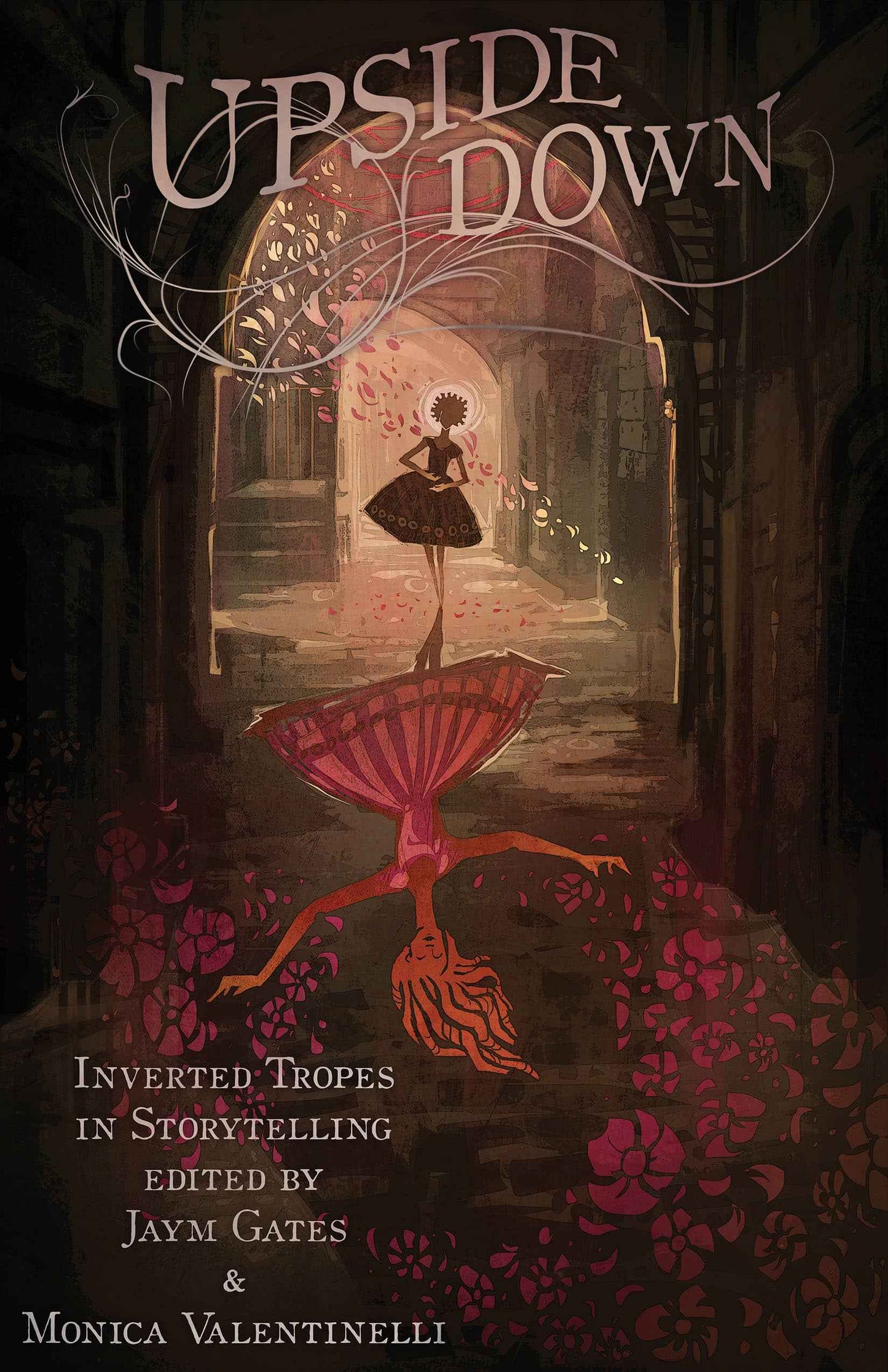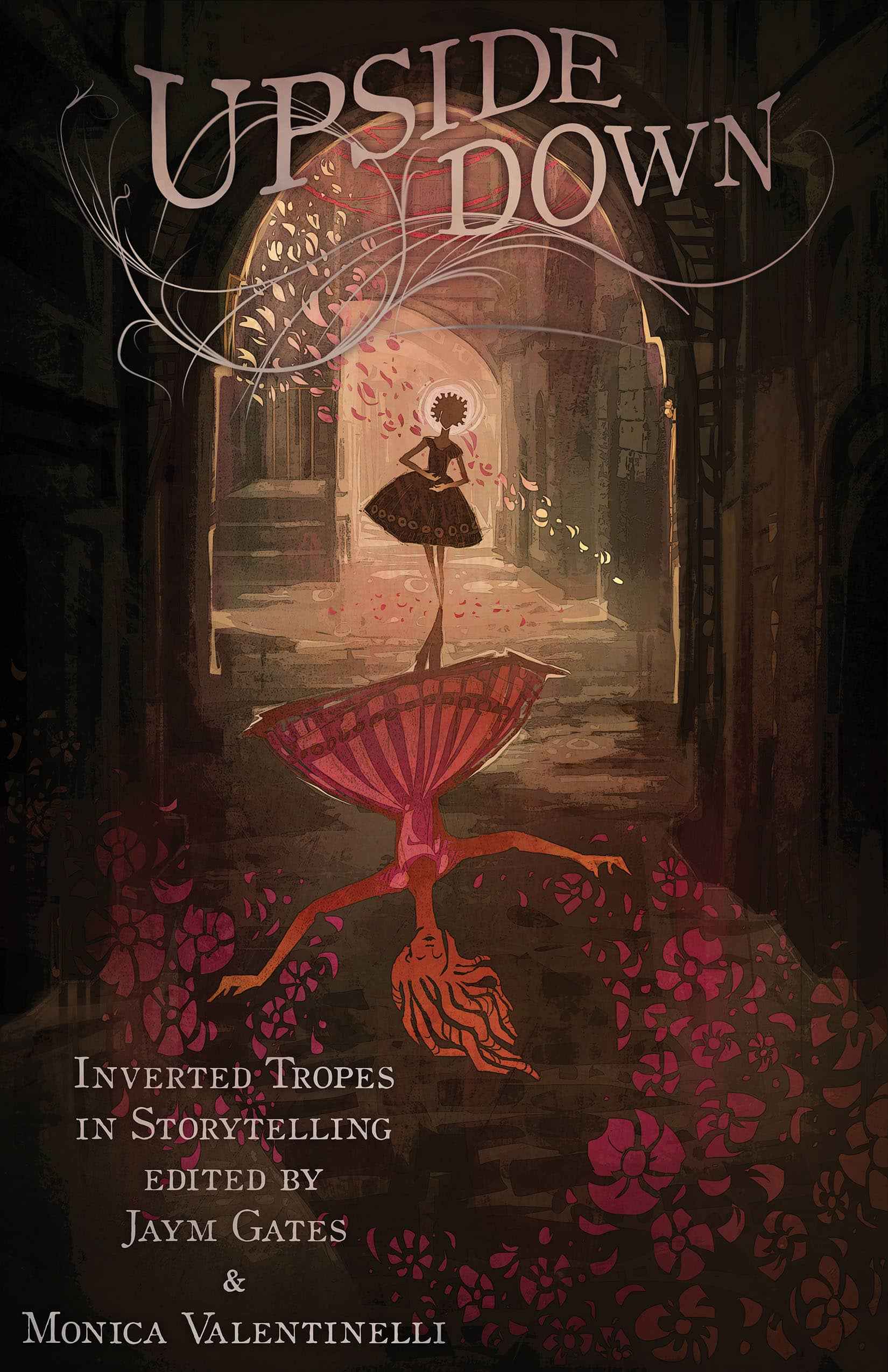Upside Down: Inverted Tropes in Storytelling
by Monica Valentinelli and Jaym Gates
Cover art by Galen Dara
ISBN 9781937009441
Pp. 366
Upside Down: Inverted Tropes in Storytelling is an anthology of short stories, poetry, and essays where writers pick a tired trope and are challenged to turn that trope upside down. Edited by Jaym Gates and Monica Valentinelli.
Read stories inspired by tropes such as the Chainmaille Bikini, Love at First Sight, Damsels in Distress, Yellow Peril, The Black Man Dies First, The Villain Had a Crappy Childhood, The Singularity Will Cause the Apocalypse, and many more...then discover what these tropes mean to each author to find out what inspired them.
Join Maurice Broaddus, Adam Troy-Castro, Delilah S. Dawson, Shanna Germain, Sara M. Harvey, John Hornor Jacobs, Rahul Kanakia, Alethea Kontis, Valya Dudycz Lupescu, Haralmbi Markov, Sunil Patel, Kat Richardson, Nisi Shawl, Ferrett Steinmetz, Anton Strout, Michael Underwood, Alyssa Wong, and many other authors as they take well-worn tropes and cliches and flip them upside down.
Table of Contents
SECTION I: INVERTING THE TROPES
"On Loving Bad Boys: A Villanelle" — Valya Dudycz Lupescu
"Single, Singularity" — John Hornor Jacobs
"Lazzrus" — Nisi Shawl
"Seeking Truth" — Elsa Sjunneson-Henry
"Thwock" — Michelle Muenzler
"Can You Tell Me How to Get to Paprika Place?" — Michael R. Underwood
"Chosen" — Anton Strout
"The White Dragon" — Alyssa Wong
"Her Curse, How Gently It Comes Undone" — Haralambi Markov
"Burning Bright" — Shanna Germain
"Santa CIS (Episode 1: No Saint)" — Alethea Kontis
"Requiem for a Manic Pixie Dream" — Katy Harrad & Greg Stolze
"The Refrigerator in the Girlfriend" — Adam-Troy Castro
"The First Blood of Poppy Dupree" — Delilah S. Dawson
"Red Light" — Sara M. Harvey
"Until There Is Only Hunger" — Michael Matheson
"Super Duper Fly" — Maurice Broaddus
"Drafty as a Chain Mail Bikini" — Kat Richardson
"Swan Song" — Michelle Lyons-McFarland
"Those Who Leave" — Michael Choi
"Nouns of Nouns: A Mini Epic" — Alex Shvartsman
"Excess Light" — Rahul Kanakia
"The Origin of Terror" — Sunil Patel
"The Tangled Web" — Ferrett Steinmetz
"Hamsa, Hamsa, Hamsa, Tfu, Tfu, Tfu" — Alisa Schreibman
"Real Women Are Dangerous" — Rati Mehrotra
SECTION II: DISCUSSING THE TROPES
"I'm Pretty Sure I've Read This Before..." — Patrick Hester
"Fractured Souls" — Lucy A. Snyder
"Into the Labyrinth: The Heroine's Journey" — A.C. Wise
"Escaping the Hall of Mirrors" — Victor Raymond
"Tropes as Erasers: A Transgender Perspective" — Keffy R.M. Kehrli
SECTION III: DEFINING THE TROPES
Afterword — Monica Valentinelli & Jaym Gates
Trope Definitions/Index of Tropes
SECTION IV: ACKNOWLEDGMENTS AND ADDITIONAL BIOS
About the Editors
Monica Valentinelli is an editor, writer, and game developer who lurks in the dark. Her work includes stories, games, and comics for her original settings as well as media/tie-in properties such as the Firefly TV show, Brandon Sanderson’s Mistborn, and Vampire: The Masquerade. Her nonfiction includes reference materials such as Firefly: The Gorramn Shiniest Language Guide and Dictionary in the ‘Verse, and essays in books like For Exposure: The Life and Times of a Small Press Publisher.
Jaym Gates is an editor, author, and communications manager. She’s the editor of the Rigor Amortis, War Stories, Exalted, and Genius Loci anthologies, as well as a published author in fiction, academic nonfiction, and RPG.
Excerpt
From: "On Loving Bad Boys: A Villanelle" by Valya Dudycz Lupescu
The bad is written all over your face.
I fill in the blanks with lush, imagined sins.
Desire grows in the empty space.
For good is just a lie; remember Blue Beard's place?
Screw virtue. I want to lick danger off your skin,
the bad is written all over your face.
I've hunted Heathcliff, melted in the Goblin King's embrace,
taken Spike between my lips, indulged Mr. Darcy's every whim.
Desire grows in the empty space.
That reckless rush: raw and true when I'm debased.
I love your rumpled shirt, your crooked, puckish grin—
the bad is written all over your face.
I'm sure you've strayed, I've been replaced;
and when you don't call, the fantasies begin.
Desire grows in the empty space.
Share

- Description
- Table of Contents
- About the Editors
- Excerpt
Upside Down: Inverted Tropes in Storytelling is an anthology of short stories, poetry, and essays where writers pick a tired trope and are challenged to turn that trope upside down. Edited by Jaym Gates and Monica Valentinelli.
Read stories inspired by tropes such as the Chainmaille Bikini, Love at First Sight, Damsels in Distress, Yellow Peril, The Black Man Dies First, The Villain Had a Crappy Childhood, The Singularity Will Cause the Apocalypse, and many more...then discover what these tropes mean to each author to find out what inspired them.
Join Maurice Broaddus, Adam Troy-Castro, Delilah S. Dawson, Shanna Germain, Sara M. Harvey, John Hornor Jacobs, Rahul Kanakia, Alethea Kontis, Valya Dudycz Lupescu, Haralmbi Markov, Sunil Patel, Kat Richardson, Nisi Shawl, Ferrett Steinmetz, Anton Strout, Michael Underwood, Alyssa Wong, and many other authors as they take well-worn tropes and cliches and flip them upside down.
SECTION I: INVERTING THE TROPES
"On Loving Bad Boys: A Villanelle" — Valya Dudycz Lupescu
"Single, Singularity" — John Hornor Jacobs
"Lazzrus" — Nisi Shawl
"Seeking Truth" — Elsa Sjunneson-Henry
"Thwock" — Michelle Muenzler
"Can You Tell Me How to Get to Paprika Place?" — Michael R. Underwood
"Chosen" — Anton Strout
"The White Dragon" — Alyssa Wong
"Her Curse, How Gently It Comes Undone" — Haralambi Markov
"Burning Bright" — Shanna Germain
"Santa CIS (Episode 1: No Saint)" — Alethea Kontis
"Requiem for a Manic Pixie Dream" — Katy Harrad & Greg Stolze
"The Refrigerator in the Girlfriend" — Adam-Troy Castro
"The First Blood of Poppy Dupree" — Delilah S. Dawson
"Red Light" — Sara M. Harvey
"Until There Is Only Hunger" — Michael Matheson
"Super Duper Fly" — Maurice Broaddus
"Drafty as a Chain Mail Bikini" — Kat Richardson
"Swan Song" — Michelle Lyons-McFarland
"Those Who Leave" — Michael Choi
"Nouns of Nouns: A Mini Epic" — Alex Shvartsman
"Excess Light" — Rahul Kanakia
"The Origin of Terror" — Sunil Patel
"The Tangled Web" — Ferrett Steinmetz
"Hamsa, Hamsa, Hamsa, Tfu, Tfu, Tfu" — Alisa Schreibman
"Real Women Are Dangerous" — Rati Mehrotra
SECTION II: DISCUSSING THE TROPES
"I'm Pretty Sure I've Read This Before..." — Patrick Hester
"Fractured Souls" — Lucy A. Snyder
"Into the Labyrinth: The Heroine's Journey" — A.C. Wise
"Escaping the Hall of Mirrors" — Victor Raymond
"Tropes as Erasers: A Transgender Perspective" — Keffy R.M. Kehrli
SECTION III: DEFINING THE TROPES
Afterword — Monica Valentinelli & Jaym Gates
Trope Definitions/Index of Tropes
SECTION IV: ACKNOWLEDGMENTS AND ADDITIONAL BIOS
Monica Valentinelli is an editor, writer, and game developer who lurks in the dark. Her work includes stories, games, and comics for her original settings as well as media/tie-in properties such as the Firefly TV show, Brandon Sanderson’s Mistborn, and Vampire: The Masquerade. Her nonfiction includes reference materials such as Firefly: The Gorramn Shiniest Language Guide and Dictionary in the ‘Verse, and essays in books like For Exposure: The Life and Times of a Small Press Publisher.
Jaym Gates is an editor, author, and communications manager. She’s the editor of the Rigor Amortis, War Stories, Exalted, and Genius Loci anthologies, as well as a published author in fiction, academic nonfiction, and RPG.
From: "On Loving Bad Boys: A Villanelle" by Valya Dudycz Lupescu
The bad is written all over your face.
I fill in the blanks with lush, imagined sins.
Desire grows in the empty space.
For good is just a lie; remember Blue Beard's place?
Screw virtue. I want to lick danger off your skin,
the bad is written all over your face.
I've hunted Heathcliff, melted in the Goblin King's embrace,
taken Spike between my lips, indulged Mr. Darcy's every whim.
Desire grows in the empty space.
That reckless rush: raw and true when I'm debased.
I love your rumpled shirt, your crooked, puckish grin—
the bad is written all over your face.
I'm sure you've strayed, I've been replaced;
and when you don't call, the fantasies begin.
Desire grows in the empty space.

Upside Down: Inverted Tropes in Storytelling







